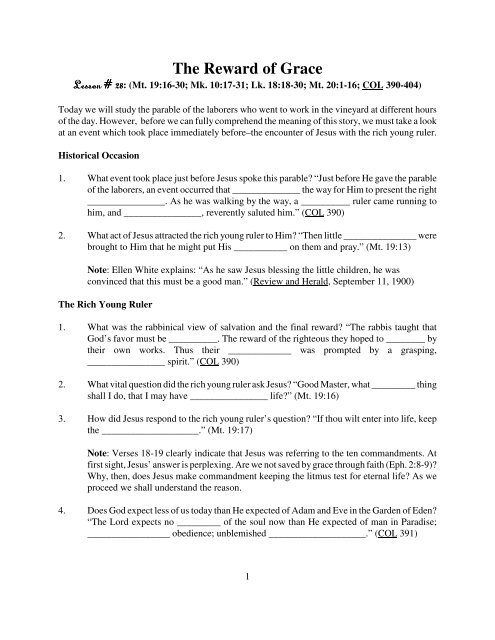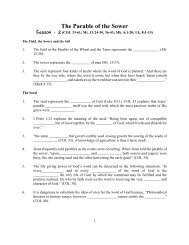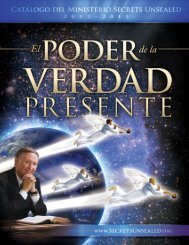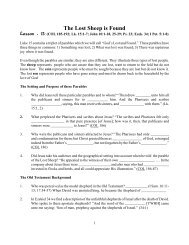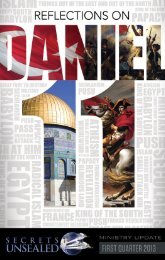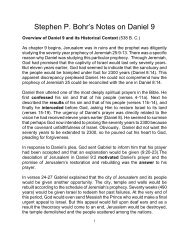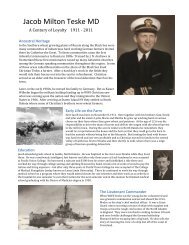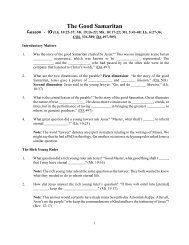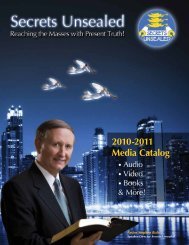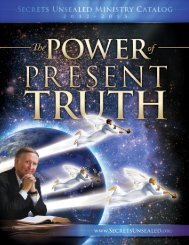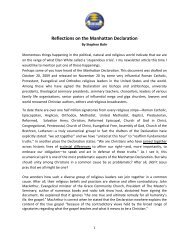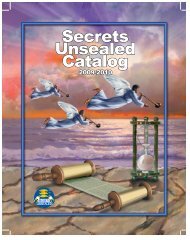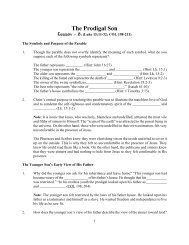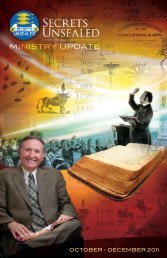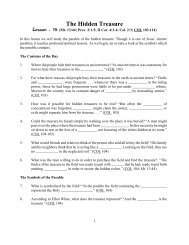The Reward of Grace - Secrets Unsealed > Home
The Reward of Grace - Secrets Unsealed > Home
The Reward of Grace - Secrets Unsealed > Home
Create successful ePaper yourself
Turn your PDF publications into a flip-book with our unique Google optimized e-Paper software.
<strong>The</strong> <strong>Reward</strong> <strong>of</strong> <strong>Grace</strong><br />
Lesson # 28: (Mt. 19:16-30; Mk. 10:17-31; Lk. 18:18-30; Mt. 20:1-16; COL 390-404)<br />
Today we will study the parable <strong>of</strong> the laborers who went to work in the vineyard at different hours<br />
<strong>of</strong> the day. However, before we can fully comprehend the meaning <strong>of</strong> this story, we must take a look<br />
at an event which took place immediately before–the encounter <strong>of</strong> Jesus with the rich young ruler.<br />
Historical Occasion<br />
1. What event took place just before Jesus spoke this parable “Just before He gave the parable<br />
<strong>of</strong> the laborers, an event occurred that ______________ the way for Him to present the right<br />
________________. As he was walking by the way, a __________ ruler came running to<br />
him, and ________________, reverently saluted him.” (COL 390)<br />
2. What act <strong>of</strong> Jesus attracted the rich young ruler to Him “<strong>The</strong>n little _______________ were<br />
brought to Him that he might put His ___________ on them and pray.” (Mt. 19:13)<br />
Note: Ellen White explains: “As he saw Jesus blessing the little children, he was<br />
convinced that this must be a good man.” (Review and Herald, September 11, 1900)<br />
<strong>The</strong> Rich Young Ruler<br />
1. What was the rabbinical view <strong>of</strong> salvation and the final reward “<strong>The</strong> rabbis taught that<br />
God’s favor must be __________. <strong>The</strong> reward <strong>of</strong> the righteous they hoped to ________ by<br />
their own works. Thus their _____________ was prompted by a grasping,<br />
________________ spirit.” (COL 390)<br />
2. What vital question did the rich young ruler ask Jesus “Good Master, what _________ thing<br />
shall I do, that I may have ________________ life” (Mt. 19:16)<br />
3. How did Jesus respond to the rich young ruler’s question “If thou wilt enter into life, keep<br />
the ____________________.” (Mt. 19:17)<br />
Note: Verses 18-19 clearly indicate that Jesus was referring to the ten commandments. At<br />
first sight, Jesus’ answer is perplexing. Are we not saved by grace through faith (Eph. 2:8-9)<br />
Why, then, does Jesus make commandment keeping the litmus test for eternal life As we<br />
proceed we shall understand the reason.<br />
4. Does God expect less <strong>of</strong> us today than He expected <strong>of</strong> Adam and Eve in the Garden <strong>of</strong> Eden<br />
“<strong>The</strong> Lord expects no _________ <strong>of</strong> the soul now than He expected <strong>of</strong> man in Paradise;<br />
_________________ obedience; unblemished ____________________.” (COL 391)<br />
1
5. Thought Question: In His answer to the rich young ruler, Jesus referred to the second table<br />
<strong>of</strong> the law. Which commandment did Jesus exclude Which commandment did He include<br />
i n i t s p l a c e W h y <br />
_____________________________________________________________<br />
________________________________________________________________________<br />
__________________________________________________________________________<br />
6. What type <strong>of</strong> obedience did the rich young ruler render the law “His conception <strong>of</strong> the law<br />
was _______________ and _________________. Judged by human standards, he had<br />
preserved an __________________ character. To a great degree his _____________ life had<br />
been free <strong>of</strong> guilt; he verily thought that his obedience had been without_______.” (COL<br />
391)<br />
Note: “Many see much to admire in the life <strong>of</strong> Christ. But true love for him can never dwell<br />
in the heart <strong>of</strong> the self-righteous. Not to see our own deformity is not to see the beauty <strong>of</strong><br />
Christ's character. When we are fully awake to our own sinfulness, we shall appreciate<br />
Christ. <strong>The</strong> more humble are our views <strong>of</strong> ourselves, the more clearly we shall see the<br />
spotless character <strong>of</strong> Jesus.” (Ellen White, Review and Herald, September 25, 1900)<br />
7. What was the canker sore <strong>of</strong> the rich young ruler’s soul “He [Jesus] showed him the plague<br />
spot <strong>of</strong> his _______________. <strong>The</strong> young man desired no further enlightenment. He had<br />
cherished an ________ in the soul; the ___________ was his ______.” (COL 392)<br />
8. What was wrong with the rich young ruler’s law obedience “He pr<strong>of</strong>essed to have kept the<br />
commandments, but he was _______________ <strong>of</strong> the ________________ which is the very<br />
spirit and life <strong>of</strong> them all. He did not possess true ________ for God or man.” (COL 392)<br />
Note: <strong>The</strong> rich young ruler’s obedience had the wrong motivating prnciple. Self, not love,<br />
was the driving force. Notice the following remarkable statement from the pen <strong>of</strong> Ellen<br />
White: “If the rich young ruler had seen by the light <strong>of</strong> the commandment that he was sinful,<br />
if, like Paul, he had honored God by obeying the commandments in spirit and in truth, his<br />
sinful nature would have been slain by the law, and he would have laid hold <strong>of</strong> eternal life.”<br />
(Review and Herald, September 11, 1900)<br />
9. What did the rich young ruler need to accept before he could serve Jesus as a preacher <strong>of</strong><br />
righteousness “But first he must accept the __________________ <strong>of</strong> discipleship. He must<br />
give himself __________________ to God.” (COL 393)<br />
10. How did Levi Matthew respond to the call <strong>of</strong> Jesus “And he left _______, rose up, and<br />
_______________ him.” (Lk. 5:28)<br />
11. What did the rich young ruler choose instead <strong>of</strong> Jesus “<strong>The</strong> young man looked upon Jesus<br />
with _________________. His heart was drawn toward the Savior. But he was not ready to<br />
2
accept the Savior’s principle <strong>of</strong> ____________________. He chose __________ before<br />
Jesus.” (COL 393)<br />
Note: <strong>The</strong> rich young ruler wanted to have his cake and eat it too. He hoarded his riches in<br />
this world and yet hoped for eternal riches in the world to come. Jesus made it crystal clear<br />
that no one can serve two masters: “You cannot serve God and mammon.” (Mt. 6:24)<br />
12. How did Judas Iscariot feel about Jesus’ demands upon the rich young ruler “Judas was<br />
________________. He thought that a mistake had been made. If such men as this ruler<br />
could be connected with the believers, they would help ____________ Christ's cause. If<br />
Judas were only received as a counselor, he thought, he could suggest many __________ for<br />
the advantage <strong>of</strong> the little church. His principles and methods would ___________somewhat<br />
from Christ's, but in these things he thought himself _________ than Christ.” (DA 719)<br />
<strong>The</strong> Disciples and Riches<br />
1. How difficult did Jesus say it is for a rich man to be saved “And again I say unto you, it is<br />
easier for a __________ to go through the eye <strong>of</strong> a ____________ than for a rich man to<br />
enter the kingdom <strong>of</strong> God.” (Mt. 19:24)<br />
Note: Ancient cities frequently had smaller gates beside the large city gates. In fact,<br />
Damascus actually has a gate called ‘Needle’s Eye.” G. Christian Weiss explains: “Camels<br />
loaded with sacks <strong>of</strong> grain, wood, charcoal, or other commodities entered the city daily. If<br />
a merchant should happen to arrive in the evening after the main gates <strong>of</strong> the city were<br />
closed, the only way he and his beast could possibly enter would be for the camel to be<br />
unloaded <strong>of</strong> all <strong>of</strong> its baggage and made to kneel and literally crawl through the ‘needle’s<br />
eye’ on his knees. Stripped bare and down to his knees! <strong>The</strong> clear implication is that a<br />
wealthy man, in order to become a Christian, must be ready to let go <strong>of</strong> his material wealth<br />
and humble himself to the level <strong>of</strong> a poverty-stricken sinner at the feet <strong>of</strong> Jesus.” (Insights<br />
Into Bible <strong>The</strong>mes and Customs, p. 25)<br />
2. What did the apostle Paul say about the danger <strong>of</strong> riches “But they that will be rich fall into<br />
temptation and a _________, and into many foolish and hurtful lusts, which drown men in<br />
_________________ and perdition. For the love <strong>of</strong> money is the _______ <strong>of</strong> all evil: which<br />
while some coveted after, they have _________ from the faith, and pierced themselves<br />
through with many sorrows.” (I Tim. 6:9-10)<br />
3. How did the disciples react when Jesus said it was hard for a rich man to enter the kingdom<br />
<strong>of</strong> God Why were they so alarmed “When His disciples heard it, they were greatly<br />
__________________, saying, ‘Who then can be ____________’” “<strong>The</strong>y [the disciples]<br />
had been taught to look upon the rich as the _______________ <strong>of</strong> heaven. . . . if the rich were<br />
to fail <strong>of</strong> entering the kingdom, what ________ could there be for the rest <strong>of</strong> men” (Mt.<br />
19:25; COL 394)<br />
3
4. What will happen when we believe the and practice the words <strong>of</strong> I Corinthians 6:19-20<br />
“When men believe this, their __________________ will be held as a __________, to be<br />
used as God shall direct, for the saving <strong>of</strong> the ________, and the comfort <strong>of</strong> the suffering and<br />
the poor.” (COL 394)<br />
5. What did Jesus mean when He said: “With men this is impossible, but with God all things<br />
are possible” (Mt. 19:26) “With man this [practicing the words <strong>of</strong> I Corinthians 6:19-20]<br />
is impossible, for the __________ clings to its ______________ treasure. . . . But with God<br />
all things are possible. By beholding the _________________ love <strong>of</strong> Christ, the selfish heart<br />
will be ___________ and subdued.” (COL 394)<br />
6. What spirit did Peter and the disciples reveal when he said to Jesus: “See, we have left all<br />
and followed You. <strong>The</strong>refore what shall we have” “But Peter’s question. . . . had revealed<br />
a spirit that uncorrected would _______ the disciples to be messengers for Christ; for it was<br />
the spirit <strong>of</strong> a ______________. While they had been attracted by the love <strong>of</strong> Jesus, the<br />
disciples were not wholly free from _________________. <strong>The</strong>y still worked with the thought<br />
<strong>of</strong> meriting a reward in proportion to their _______________” (COL 396)<br />
7. What will be the reward <strong>of</strong> those who apply the principles Jesus taught “And everyone who<br />
has _________ houses or brothers or sisters or father or mother or wife or children or<br />
_____________, for My name’s __________, shall receive a hundredfold, and inherit eternal<br />
life.” (Mt. 19:29)<br />
Note: Jesus was not telling us to become hermits or to take vows <strong>of</strong> poverty in order to enter<br />
eternal life. Neither is he telling us to forsake our families. Jesus is teaching us a lesson about<br />
priorities. That is to say, nothing can be allowed to stand in the way <strong>of</strong> our relationship with<br />
Jesus. He must occupy first place, our fellow-men second place and ourselves last place.<br />
Motives for Service<br />
1. What central truths did Jesus teach in the parable <strong>of</strong> the vineyard laborers “It is only through<br />
the __________________ grace <strong>of</strong> Christ that any man can find ______________ into the<br />
city <strong>of</strong> God. . . . [<strong>The</strong> parable illustrates] the _____________ in which God deals with His<br />
servants, and the ___________ in which He desires them to labor for Him.” (COL 394, 396)<br />
2. What is represented by the landowner and the hired laborers “<strong>The</strong> householder’s dealing<br />
with the workers in his vineyard represents ________ dealing with the __________ family.”<br />
(COL 396-397)<br />
3. In what sense does God’s method <strong>of</strong> compensation differ from that used by men “In worldly<br />
business, compensation is given according to the _______ accomplished. <strong>The</strong> laborer expects<br />
to be paid only that which he _________. But in the parable, Christ was illustrating the<br />
4
principles <strong>of</strong> His kingdom–a kingdom not <strong>of</strong> this world. . . . <strong>The</strong>y [the laborers <strong>of</strong> the<br />
vineyard] were ______________, not according to the amount <strong>of</strong> their labor, but according<br />
to the _______________ <strong>of</strong> his purpose.” (COL 397)<br />
4. What is the basis for our final reward “His reward is given not according to our ________<br />
but according to his own purpose. . . . ‘Not by works <strong>of</strong> righteousness which _____have<br />
done, but according to His _________ He saved us.’” (COL 397)<br />
5. Thought Question: How can we reconcile Paul’s statement in Titus 3:5 with other texts<br />
which clearly teach that we shall be rewarded according to our works (Mt. 16:27; Rev.<br />
22:12; II Cor. 5:10; Mt. 25:34-40)_______________________________________________<br />
________________________________________________________________________<br />
__________________________________________________________________________<br />
6. What is more important than the amount <strong>of</strong> labor we do for Christ “Not the amount <strong>of</strong> labor<br />
performed or its visible _______________ but the ___________ in which the work is done<br />
makes it <strong>of</strong> value with God.” (COL 397)<br />
7.<br />
5


